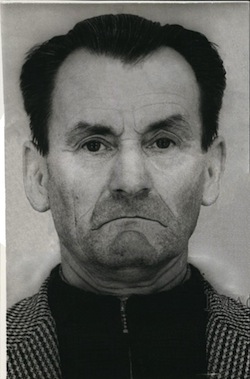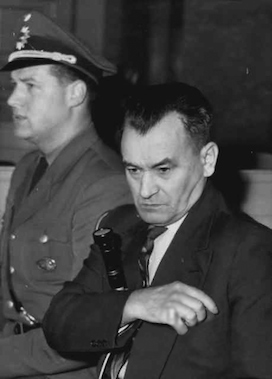History's Judgement: Gottlieb Muzikant
 Gottlieb Muzikant (b. 27 December 1903, d. ?), was born in Mürau in German-speaking Mähren (Moravia), a region of the Austro-Hungarian empire from 1867 to October 1918. The city of Murau became part of Czechoslovakia in 1918, then part of Nazi Germany in September 1938. Muzikant's Czech father was a prison guard, his mother was a deeply religious German catholic. His father died in World War I. After the Czechoslovakia became independent, and Gottlieb Muzikant enlisted in the Czech army. His mother influenced him in that she had wanted him to become a monk, so after his military service he then entered a monastery near Vienna serving as a church verger (an usher or sexton) while also working as an unskilled laborer. In 1928 Gottlieb Muzikant married, he would go on to father two daughters. By the time his war crimes trial commenced in 1959, his brother was a monk in communist East Germany.
Gottlieb Muzikant (b. 27 December 1903, d. ?), was born in Mürau in German-speaking Mähren (Moravia), a region of the Austro-Hungarian empire from 1867 to October 1918. The city of Murau became part of Czechoslovakia in 1918, then part of Nazi Germany in September 1938. Muzikant's Czech father was a prison guard, his mother was a deeply religious German catholic. His father died in World War I. After the Czechoslovakia became independent, and Gottlieb Muzikant enlisted in the Czech army. His mother influenced him in that she had wanted him to become a monk, so after his military service he then entered a monastery near Vienna serving as a church verger (an usher or sexton) while also working as an unskilled laborer. In 1928 Gottlieb Muzikant married, he would go on to father two daughters. By the time his war crimes trial commenced in 1959, his brother was a monk in communist East Germany.
Right: former SS-Unterscharfürhrer Gottlieb Muzikant. Photo (31,337 bytes) taken in Fulda by West German Police on 5 May 1959 after he was arrested for war crimes.
Click on image to see enlarged view (72,074 bytes).
In 1940 he joined the German SS and became a medical aid in the SS-Totenkopfverbände ("Death's-Head Units"). He was assigned to Ravensbruck, then to the Detainment Center Staff at Konzentrationslager (KL for Concentration Camp) Steyr-Münichholz a sub camp of Mauthausen, then later transferred to KL Melk, Maybe it was his nature or possibly his zealousness to impress his superiors, but Muzikant became among the more cruel and unfeeling murderers at the camps where he served. In 1943 and between August 1944 to April 1945 he gave lethal injections of phenol, usually directly into the heart as was common practice by others at these camps, all the while pretending to the intended victim that these were medications. He killed others by shooting, by strangulation, by hanging, or neglect. His victims included Slovak, Soviet, Czech, Hungarian, and others of unknown origin. Muzikant ended the war as a SS-Unterscharfürhrer (SS-Under Company Leader) captured in April 1945 by the Americans among countless thousands of other German soldiers. He somehow escaped custody and went on to live under his own name in West Germany, finally settling down as a laborer in Fulda; it was not uncommon for possible war criminals to go undetected or slip through custody given the chaotic aftermath of the war.
Muzikant might have never been prosecuted had not his name been brought up in a local bigamy investigation. As that criminal investigation commenced the West German police recognized he was in their list of war criminals to be apprehended and so Muzikant was arrested in Fulda on 30 April 1959. Muzikant was charged criminally, and brought to trial in a Justiz und NS-Verbrechen (Justice & Nazi Crimes) proceeding at the Landgerichte (district court) Fulda, in LG Fulda Case No. 601223; this was Case No. 502 of Nazi Crimes in Detainment Centers. He was charged only in those cases where the prosecution determined there was sufficient evidence and witnesses to present the facts at his trial; this would still amount to some hundreds of victims.
 The trial commenced on 31 November 1960. At his trial Muzikant provided chilling and matter of fact testimony that stunned even the German jurors at his trial. His testimony was reported in newspapers world-wide that reminded the world that was then trying to put the war behind itself that atrocities of the worst kind had been committed and should never again be allowed to happen. He was described in the papers as "a person of medium height, with black hair with very dark, staring eyes, a big nose, a protruding chin", and with "massive bony hands". Muzikant explained to the court that he had not considered enemies of the State to be human beings and furthermore, he had been shown "how to kill people quickly and painlessly". He tended to avoid using the word 'kill' in his answers at court. He said that he did not know the nationality of most of the prisoners that he dispatched nor did it matter to him, explaining rather matter of factly:
The trial commenced on 31 November 1960. At his trial Muzikant provided chilling and matter of fact testimony that stunned even the German jurors at his trial. His testimony was reported in newspapers world-wide that reminded the world that was then trying to put the war behind itself that atrocities of the worst kind had been committed and should never again be allowed to happen. He was described in the papers as "a person of medium height, with black hair with very dark, staring eyes, a big nose, a protruding chin", and with "massive bony hands". Muzikant explained to the court that he had not considered enemies of the State to be human beings and furthermore, he had been shown "how to kill people quickly and painlessly". He tended to avoid using the word 'kill' in his answers at court. He said that he did not know the nationality of most of the prisoners that he dispatched nor did it matter to him, explaining rather matter of factly:
When answering some accusations and testimony of having strangled some prisoners with his bare hands he replied "Perhaps I just gripped them hard on their necks".
He explained how once after he suggested several ailing prisoners hang themselves and after he had supplied the straps to do so, he came back to find one of them hanging still alive. So he demonstrated for the court how he snapped the neck of that person by pushing his head forward into the noose; this was shocking and unsettling to many in the court - though not so to Gottlieb Muzikant.
Gottlieb Muzikant was convicted of war crimes and murder including the murder of ninety (90) Czech, Slovakian, Russian and Hungarian prisoners by phenol injections, the shootings and strangulations of another one hundred (100) inmates. On 23 December 1960 he was sentenced to twenty one (21) terms of life imprisonment at hard labor plus fifteen (15) additional years imprisonment. Had Muzikant been captured by the allies, he no doubt would have been hanged. But when he was finally arrested West Germany had no death penalty.